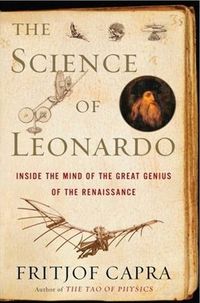

Purchase
Inside the Mind of the Great Genius of the Renaissance
Doubleday
November 2007
On Sale: October 30, 2007
352 pages
ISBN: 0385513909
EAN: 9780385513906
Hardcover
Add to Wish List
Non-Fiction
Leonardo da Vinci’s pioneering scientific work was virtually
unknown during his lifetime. Now acclaimed scientist and
bestselling author Fritjof Capra reveals that Leonardo was
in many ways the unacknowledged “father of modern science.”
Drawing on an examination of over 6,000 pages of Leonardo’s
surviving notebooks, Capra explains that Leonardo approached
scientific knowledge with the eyes of an artist. Through his
studies of living and nonliving forms, from architecture and
human anatomy to the turbulence of water and the growth
patterns of grasses, he pioneered the empirical, systematic
approach to the observation of nature—what is now known as
the scientific method. Leonardo's scientific explorations were extraordinarily
wide-ranging. He studied the flight patterns of birds to
create some of the first human flying machines. Using his
understanding of weights and levers and trajectories and
forces, he designed military weapons and defenses, and was
in fact regarded as one of the foremost military engineers
of his era. He studied optics, the nature of light, and the
workings of the human heart and circulatory system. Because
of his vast knowledge of hydraulics, he was hired to create
designs for rebuilding the infrastructure of Milan and the
plain of Lombardy, employing the very principles still used
by city planners today. He was a mechanical genius, and yet
his worldview was not mechanistic but organic and
ecological. This is why, in Capra's view, Leonardo's
science—centuries ahead of his time in a host of fields—is
eminently relevant to our time. Enhanced with fifty beautiful sepia-toned illustrations, The
Science of Leonardo is a fresh and important portrait of a
colossal figure in the world of science and the arts.
Comments
No comments posted.
Registered users may leave comments.
Log in or register now!
| 


 © 2003-2024 off-the-edge.net
all rights reserved Privacy Policy
© 2003-2024 off-the-edge.net
all rights reserved Privacy Policy